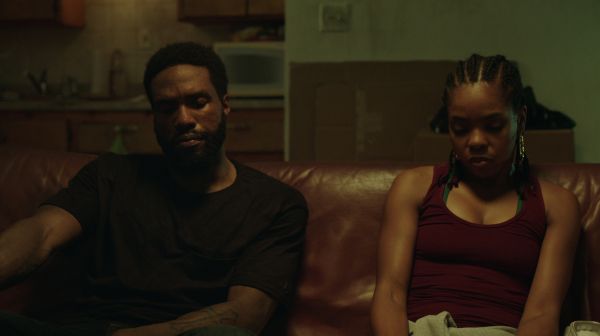Olivia Newman
50. First Match, directed by
Olivia Newman
Hard Knock Life
By Rose Marel
For Monique, wrestling friends is better than wrestling enemies. She may not consider herself a victim, but Mo’s history of hardship provides a well of rage and hurt so deep-rooted that it has the potential to destroy anyone in her wake, herself included. Before her life takes on an irreparably destructive course, Mo turns to competitive wrestling. Far from just the perfect outlet, wrestling is also the ray of inspiration that Mo so desperately needs.
Her chaotic home life introduces itself to us in a downward fluttering of scarves. Along with Mo’s clothes – thrown out the window by Mo’s latest carer – are words, hurled with a similar force. In a torrent of obscenity, a to-and-fro begins, from up high and down below, of “slut ass” calls and “dumb bitch” responses. Mo, ostentatiously styled with pink hair, oversized hoops and florescent green acrylic nails, isn’t afraid of attention or confrontation. But what’s it all covering? What is she afraid of?
Hers is a life characterised by movement: a constant jostling between foster homes and a magnetic pull towards physical altercations, which all contribute to a further, internal restlessness. The camera reflects this in its ever-moving eye. Rarely static, it tremors with a subtle rock or shake, as if the camera has adopted the perspective of a person following the action on foot. Eschewing perfection, it lacks the sleekness of more commercial dramas, choosing instead a more fitting representation of the downtrodden struggles of Brooklyn.
Mo’s head is similar to that of the camera in her dizzy flurry of emotions and scramble of confused, never-ending thoughts. Never placid, it’s the heightened awareness of a fighter. The camera’s unsteady focalisation invokes a physicality to the action, highlighting the role of movement, while placing us inside the mind of a street-smart, limber and ready hustler. But one who is, despite appearances, not immovable.

We get a sense of life here: New York lower-class, the housing commissions, the foster kids, the ones who endlessly pound the pavewalk because no where else feels like home. Mo’s one of those, and many of the shots are situated as she walks or holds conversations (or confrontations) on the sidewalks.
Newman picks up on the minutiae of these communities as Mo watches women through windows getting weaves, or as children get scolded by their mothers. Stray cats prowl besides stray girls. It’s familiar and lonely at the same time, as hip hop colours the scenes with an urban synchronicity. Lyrics often allude to the action, at one moment singing “She used to hit me with a strap when I was bad…” just as Mo, using her hurt as armour, turns her skulk into a strut on the dimly lit streets.
Only when Mo runs into her father, released without her knowledge from prison, do things begin to change. Desperate to earn his approval, Mo joins the all-male wrestling club, a world once dominated by her father. She has a natural flair for the sport and a tenacity that raises the collective bar among her new team. More than that, releasing her aggression in a controlled environment proves beneficial (for herself and others).
The wrestling matches contrast the darkened street scenes, with bright colour and encouraging faces. The camera moves with the fight, getting in close to capture every move, and traversing with them as they glide across the ring. It’s a physical sport, but one with a certain energy and strategy, as competitors assess the other, relying on more than just brute strength.
As Mo improves, her father begins encouraging her to enter another form of fighting, one that is less-controlled and certainly less supportive. Ushering her into a dingy, blood-splattered underground boxing ring, Mo finds herself torn as she flounders between the alluring prospects of money and paternal love or the potential destruction of her new wrestling ambitions. It’s a battle of priorities, one in which these two worlds – and those who inhabit them – cannot coexist.
The transformation of our protagonist – with her physical metamorphosis echoing a deeper, more resonant one – is akin to watching a toddler haltingly find their feet. The story works against the wider backdrop of a sexist society, touching thematically on this while exploring more personal ideas of abandonment, love and inner-strength. Newman manages to unwind these intimate themes in a way that’s brutally honest and never tires in its boundlessly energetic portrayal of youth, violence, regret and redemption.